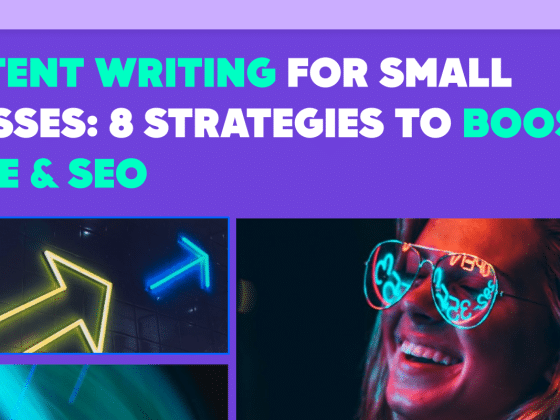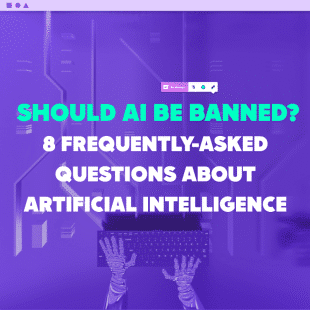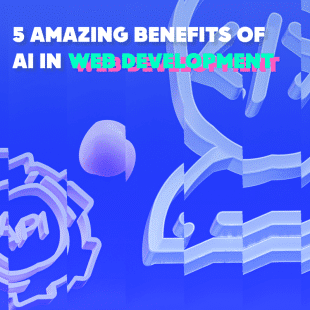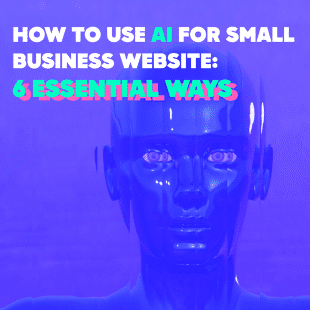+ 4 More Set to Break Through

Today, we’ll be looking at 7 of the most popular AI companies in 2024. These are companies either creating their own AI models or offering AI-based tools for tasks like video editing and copywriting. This will hopefully give you a better idea of the current AI landscape, and how this cutting-edge technology is being used.
To keep things interesting, we’ll also be covering a couple of companies that we think are primed to break through in the next year. So, stick around to the end of the article to see our picks for the best up-and-coming AI companies as well.
What is an AI Company?
Before diving into our list, it’s important to make a few things clear. Namely, what makes a business an AI company?
While there are plenty of businesses that have implemented AI into their product or service, we want to highlight companies that use AI technology at the core of their business. These companies can essentially be split into 2 categories:
- Companies that generate their own AI models
- Companies that use AI to create specific tools
First, there are several companies that develop their own AI models. These are mainly used for generating language, images, or video. These businesses allow individuals or other companies to use their model for their own use. This can be through desktop use, a specific application, or APIs (Application Programming Interfaces) used to implement the AI model into another application.
We’ll also be considering companies that use AI – either with an existing model, or their own tech – to create specific tools. These companies are not meant to be implemented into new applications but instead help solve specific problems.
So, an AI company is any business that is primarily based around AI technology. Any company that’s added one or two AI features to their existing product or service doesn’t count.
How We Picked the AI Companies For Our List
OK, now that we’ve got our definition for an AI company out of the way, how did we pick the companies for our list?
The primary metric we used to sort these companies was search traffic estimates. While it’s not a 100% accurate method for estimating user bases, it gives us a good idea of the interest surrounding any given company.
We also wanted to highlight companies that provide unique tools with real-world applications. This is to showcase how AI technology can be applied for more specialized tasks and to provide a more complete picture of the current AI landscape.
Aside from popularity, we’ll be ranking each company based on a combination of its feature variety, value for money, language variety/accesibility, ease of use and utility.
So, with all this being said, let’s get into our list!
7 Most Popular AI Companies in 2024
All of the companies we’re about to cover have slightly different use cases, showing the variety of tasks that can be streamlined using AI.
From some companies you’ve probably heard of to a few that may be new to you, here’s our list of the 7 most popular AI companies around today.
From some companies you’ve probably heard of to a few that may be new to you, here’s our list of the 7 most popular AI companies around today.
| Monthly Traffic | Overall Score | Feature Variety | Value for Money | Language Variety / Accessibility | Ease of Use | Utility | |
| Open AI | ~97.4m | 49 | 9.5 | 10 | 9.5 | 10 | 10 |
| Midjourney | ~1.9m | 46 | 8.5 | 9.5 | 9 | 9.5 | 9.5 |
| Stability | ~607k | 47.5 | 10 | 10 | 9 | 8.5 | 10 |
| Synthesia | ~541k | 47 | 9 | 9 | 10 | 10 | 9 |
| CopyAI | ~480k | 46 | 9 | 8.5 | 9.5 | 10 | 9 |
| Runway | ~250k | 47 | 9 | 10 | 8.5 | 10 | 9.5 |
| Systran Translate | ~216k | 47 | 8.5 | 9.5 | 10 | 10 | 9 |
1. OpenAI
Estimated Monthly Traffic: ~97.4m
Best For: Creative tasks and problem-solving using ChatGPT. Image creation using the Dall-E 3 image model.
Pricing:
|
Free |
Plus |
Team |
Enterprise |
|
| Features | Use of GPT-3.5 | Use of GPT-4, DALL-E, and Custom GPTs | Everything from Plus + Higher Message Caps | Unlimited Access |
| Cost Per User | Free | $20/mo | $30/mo ($25/mo when billed annually) | Custom Pricing |
Starting our list of the most popular AI companies is the one you’re probably already the most familiar with. We’re of course talking about OpenAI.
To put OpenAI’s popularity in the AI space into scale it has an estimated 97.4 million monthly visitors – that’s over 50 times the traffic of the runner-up spot on our list! In the several years since OpenAI released ChatGPT to the public, it’s become synonymous with the use of AI technology. So, what makes this company so popular?
OpenAI rose to popularity for being one of the first companyies to offer state-of-the-art AI technology to the general public. They’ve continued to push innovation, with the GPT-4 and DALL-E models being some of the most advanced tools for text and image generation available. It doesn’t hurt that they’ve also received billions of dollars in funding from Microsoft as well. So, all things considered, it’s no wonder that OpenAI has been able to pull so far ahead of its competitors.
OpenAI also offers access to their models through APIs. This means the technology behind ChatGPT and DALL-E can be frictionlessly integrated into existing software. From Coca-Cola to Snapchat, there are tons of companies implementing OpenAI’s technology. Microsoft – which has made massive investments into OpenAI – is even using ChatGPT to power its Bing search engine, with plans to also use it across its Office suite of software as well.
With ChatGPT Plus only costing $20/month to use, OpenAI offers cutting-edge AI technology to the public in a very affordable package. Just be aware that when you upgrade, GPT-4 access is limited to 40 messages every 3 hours. However if you need greater acces, you do appear to get more usage out of the slightly more expensive team membership.
Even with these usage limits, in our experience, there aren’t many AI companies out there able to rival the quality of OpenAI’s models. No matter how the AI landscape shifts over the coming years, expect OpenAI to always be near the top of the pack.
|
Overall Score: |
Feature Variety: |
Value for Money: |
Language Support/Accessibility: |
Ease of Use: |
Utility: |
| 49 | 9.5 | 10 | 9.5 | 10 | 10 |
2. Midjourney
Estimated Monthly Traffic: ~1.9m
Best For: Image Generation
Pricing:
|
Basic Plan |
Standard Plan |
Pro Plan |
Mega Plan |
|
| Fast GPU Time | 3.3 hr/mo | 15 hr/mo | 30 hr/mo | 60 hr/mo |
| Cost | $10/mo or ($8/mo when paid annually) | $30/mo ($24/mo when paid annually) | $60/mo ($48/mo when paid annually) | $120/mo ($96/mo when paid annually) |
Next up is Midjourney, which is a much smaller company than OpenAI. According to their site, they only currently employ 11 full-time staff. Despite this, they’ve still managed to reach impressive monthly traffic of 1.9m because of their AI image generation software.
Midjourney is a much more limited software than OpenAI, with image generation being its main feature. You can ask Midjourney’s bot to generate and edit images through specific commands such as /imagine and /blend.
It’s worth noting that the Midjourney AI is currently only available through a Discord bot. Of course, this restriction to discord may be limiting larger-scale adoption of Midjourney’s model. With this being said, Midjourney’s AI is one of the best pure image generators currently available. From our experience, images will more often than not look exactly how you describe them.
Unfortunately, Midjourney’s popularity may be affecting its utility. The number of people using Midjourney can cause the model to be throttled. We found that depending on the time of day, you could expect long queues and slow image generation.
As mentioned Midjourney has a very small team for how large their company’s gotten. As a result, their customer service currently leaves a lot to be desired, and we’ve noticed people online having issues with cancellations not going through. However, they do have a very active Discord community, which does offer plenty of support for any issues.
There are 4 different pricing plans ranging from $10-120/month, with the main difference being access to the fast GPU. The company doesn’t offer a free membership option in the way OpenAI does. However, with the obvious limitations this AI model has, this may be a good thing for paying users who are already experiencing limitations. Still, a free trial would be great for testing the product out.
Overall, Midjourney offers a state-of-the-art image generator. With their Basic Plan being significantly cheaper than a ChatGPT Plus plan, it may be a good alternative for those who just want the use of AI images without the need for language generation.
It will be interesting to see if Midjourney will continue to add new features, and where the company will end up in the ever-changing AI landscape.
|
Overall Score: |
Feature Variety: |
Value for Money: |
Language Support/Accessibility: |
Ease of Use: |
Utility: |
| 46 | 8.5 | 9.5 | 9 | 9.5 | 9.5 |
3. Stability AI
Estimated Monthly Traffic: ~607k
Best For: Image, Video, Audio, & Language Generation
Pricing:
|
Non-Commercial |
Professional |
Enterprise |
|
| Access Rights | Non-Commercial Usage | Commercial Usage | Commercial Usage |
| Cost | Free | $20/mo | Custom Pricing |
Next on our list is a full AI suite that includes models for images, videos, and language. This is arguably the most complete set of AI tools available, however, this does come with some drawbacks.
Stability AI’s model Stable Diffusion is likely the most customizable image generator on the market. This is probably what Stability is most commonly used for at this point. The tool can be accessed through Stability’s desktop apps – Clipdrop for a simple version, and DreamStudio for a more complete version. Stable Diffusion can also be installed directly onto your computer if you want to train the model directly.
The vast amount of tools and customization provided by Stable Diffusion comes at the price of accessibility. Unlike OpenAI, Stable Diffusion offers near-endless customization options with their image generation. While we found it manageable, this would probably be overwhelming and difficult to use for most beginners.
Beyond images, Stability offers 4 other models, making it a very complete suite of AI tools. The fact that all of these tools are accessible for free – albeit without commercial usage rights – is a major pro. For only $20/month, the professional plan which allows commercial usage also won’t cost you an arm and a leg. Similar to OpenAI, Stability also offers an API for integration into various applications.
Stability doesn’t have nearly as much adoption as OpenAI or Midjourney, which may largely come down to ease of use. However, this suite will likely be the go-to choice for anybody looking to push generative AI tech to its absolute limit.
|
Overall Score: |
Feature Variety: |
Value for Money: |
Language Support/Accessibility: |
Ease of Use: |
Utility: |
| 47.5 | 10 | 10 | 9 | 8.5 | 10 |
4. Synthesia
Estimated Monthly Traffic: ~541k
Best For: Video Generation (specifically Text-to-Video of people speaking or performing actions)
Pricing:
|
Starter |
Creator |
Enterprise |
|
| Users | 1 editor, 3 commenters | 1 editor, 5 commenters | Custom number of editors and commenters |
| Video Minutes | 10min/mo | 30min/mo | Unlimited |
| Cost | $29/mo ($22/mo when paid annually) | $89/mo ($67/mo when paid annually) | Custom Pricing |
Synthesia is a piece of AI software designed to create lifelike video voiceovers. You input your text, choose a speaker, and you’ll have a realistic human model reading your script in a matter of minutes!
This is one of the most user-friendly tools we’ve covered so far, which we believe is a big reason it’s become so popular. Synthesia will be incredibly useful for anybody in video production looking to save a ton of time and resources. With over 120 languages supported and numerous diverse models to choose from, Synthesia is also ready to be used in practically any market around the world.
They do have a ton of extra features, including an AI script generator which makes Synthesia useful for making videos from start to finish. Their script generator is pretty solid from our experience, although as with most AI-generated content, you’ll probably want to edit the scripts slightly to add a human touch before generating any videos.
While we find the videos turn out well, the AI models often look a little strange. They usually look fine, just don’t expect a Synthesia video to fool anybody into thinking it’s a real person.
So, you may be sacrificing some overall quality in exchange for a convenient, cost-effective way to produce videos. Still, with a monthly Synthesia membership being way cheaper than a professionally shot video, this will be a worthwhile tradeoff for many businesses.
This technology is especially relevant for businesses that need to produce lots of content, with e-learning and advertising being two prime examples.
This is a specialized tool for a specific purpose, namely video voice overs. While it won’t be valuable to everybody, for certain businesses that need cheap video content, this will be a very useful piece of technology.
Especially as Synthesia continues to refine its technology, expect this style of video voiceover to become more and more commonplace.
|
Overall Score: |
Feature Variety: |
Value for Money: |
Language Support/Accessibility: |
Ease of Use: |
Utility: |
| 47 | 9 | 9 | 10 | 10 | 9 |
5. Copy AI
Estimated Monthly Traffic: ~480k
Best For: Language Generation, specifically for Copywriting
Pricing:
|
Free |
Pro |
Team |
Growth |
Expansion |
Scale |
|
| # of Users | 1 | 5 | 20 | 75 | 150 | 200 |
| Words in Chat | 2k | Unlimited Words in Chat | ||||
| Workflow Credits | 200 Total | 500/mo | 3k/mo | 20k/mo | 45k/mo | 75k/mo |
| Cost | Free | $49/mo ($36/mo when paid annually) | $249/mo ($186/mo when paid annually) | $1,333/mo ($1,000/mo when paid annually) | $2,666/mo ($2,000/mo when paid annually) | $4,000/mo ($3,000/mo when paid annually) |
Copy AI is the most focused AI tool for copywriting on the market. It’s designed with outcomes in mind, meaning it can help with generating specific forms of copy, from email marketing campaigns to complete blog posts.
It’s worth noting this is the first company we’re covering that doesn’t use its own AI model. It appears Copy AI currently uses a combination of language models for its product, from OpenAI’s ChatGPT to Anthropic’s Claude (more on this smaller language model later).
Because Copy AI largely uses OpenAI’s language models, you may wonder how Copy AI’s workflows differ from a ChatGPT Plus membership. We believe the main difference here is that Copy AI features a suite of tools designed for highly specific marketing purposes.
Where Copy AI stands out from the language models it uses is its vast array of Workflow templates. Whatever marketing task you’re looking to accomplish, Copy AI probably has a workflow to speed up the process. Whether it be creating outbound e-mail campaigns, generating content briefs, or improving internal and external linking.
For example, let’s take a look at Copy AI’s Cold Outbound Email Workflowcan. This can help you: scrape profiles, extract names, generate subject lines, and generate cold emails. This workflow would streamline all the tedious work associated with sending outbound emails, allowing marketers to dedicate their time to more important tasks.
While there are GPTs available that could help you create similar workflows, with Copy AI, you’re paying for a streamlined plug-and-play set of solutions specifically for marketing. In this sense, Copy AI will likely provide more outright value than ChatGPT for a marketing professional, while an average person will most likely get more value out of the more open-ended ChatGPT.
Copy AI can also be seamlessly integrated with over 2,000 different tools/applications like Zoom, Airtable, Google Sheets, and Slack. This makes their technology easy to implement into any existing marketing strategy.
Copy AI has earned its popularity for being the most complete set of AI tools for generating copy and automating marketing processes. This makes it well suited to individual marketing professionals and companies looking to revitalize their marketing strategy with an injection of AI tech. Still, it’s worth noting that outside of marketing, Copy AI likely won’t provide much value.
|
Overall Score: |
Feature Variety: |
Value for Money: |
Language Support/Accessibility: |
Ease of Use: |
Utility: |
| 46 | 9 | 8.5 | 9.5 | 10 | 9 |
6. Runway
Estimated Monthly Traffic: ~250K
Best For: Image & Video Generation
Pricing:
|
Basic |
Standard |
Pro |
Unlimited |
Enterprise |
|
| Credits | 125 Total | 625/mo | 2250/mo | Unlimited | Custom |
| Editors | 3 | 5 | 10 | 10 | Enterprise Wide |
| Cost per User | Free | $15/mo ($12/mo when paid annually) | $35/mo ($28/mo when paid annually) | $95/mo ($76/mo when paid annually) | Custom Pricing |
Next on our list of the most popular AI companies is Runway, which is a specialized image and video generator. Out of all the businesses we’ve covered, it’s probably most similar to Stability AI.
Like Stability, Runway offers multiple AI models, although they are all centered around video and image editing and generation. Runway has more than 20 AI tools that have specific applications like text-to-video generation, image-to-image transformation, subtitle generation, and so much more.
The image-to-image/video-to-video generation from Runway appears to be a largely unique feature. It allows you to change the style of a video in a matter of seconds – like turning real-life footage into a cartoon for example. There are also plenty of tools great for general video editing tasks, like adding slow motion, subtitles, and editing backgrounds.
Because of its specialized AI tools, Runway appears to be very user-friendly. It doesn’t appear to have the same barrier to entry that something like Stability has. With that being said, one of their tools allows you to train an AI model for your own specific needs. So you still appear to have plenty of customization options here.
It’s worth pointing out that Runway doesn’t offer any language generation in their suite of tools, instead being completely focused on image and video generation. While this isn’t a major downside, it does stop Runway from being a truly complete set of AI tools. Runway is also currently only available in American English, which will greatly restrict its use for those around the globe.
Especially for video creators who want to try using AI in their work for the first time, Runway offers a user-friendly, yet powerful platform for doing so.
|
Overall Score: |
Feature Variety: |
Value for Money: |
Language Support/Accessibility: |
Ease of Use: |
Utility: |
| 47 | 9 | 10 | 8.5 | 10 | 9.5 |
7. Systran Translate
Estimated Monthly Traffic: ~216k
Best For: Advanced Text Translation
Pricing:
|
Pro Lite |
Pro Plus |
Pro Premium |
Pro Speech |
|
| Users | 1 | 20 | 50 | 50 |
| Pages of Text/mo | ~150 | ~600 | ~2,000 | ~2,000 |
| Bonus Features | Includes Basic File Translation | Everything from Pro Lite + PDF File Translation | Everything from Pro Plus + Systran Model Studio | Everything from Pro Premium + Speech Translation |
| Cost per User | $7.99.mo ($5.49/mo when paid annually) | $21.99/mo ($15.49/mo when paid annually) | $44.99 ($34.99/mo when paid annually) | $79.99 ($61.99/mo when paid annually) |
Closing out our list is another specialized AI tool in Systran Translate. Their goal is to improve international collaboration by using AI technology to translate documents quickly and efficiently.
As you can imagine, this technology has tons of applications for businesses that operate in multiple languages. Especially for companies looking to expand more into foreign markets, quality, cost-effective translation could be a game-changer.
Systran currently offers its service in 55 languages. Depending on the pricing tier, you’re also able to translate directly from PDF files and even live speech.
Systran currently offers a free translator on their site that is capped at 5,000 characters at a time. This tool appears to be virtually identical to Google Translate. They also offer a free trial of their services, but you will have to start paying after 14 days to continue translating full documents.
Similar to the previous 2 entries on our list, Systran offers a tailored solution to a specific problem. For the average Joe, Systran’s free desktop app or Google Translate will be just fine. However, for global businesses who need to translate large amounts of writing, Systran Pro will be an absolute lifesaver.
|
Overall Score: |
Feature Variety: |
Value for Money: |
Language Support/Accessibility: |
Ease of Use: |
Utility: |
| 47 | 8.5 | 9.5 | 10 | 10 | 9 |
Top 4 AI Companies Set to Blow Up in 2024
The 7 companies we covered above are the current powerhouses in the world of AI. But, as you know, AI tech is still new, and it’s always evolving. This means there’s always room for lesser-known companies to push ahead and start making waves.
That’s why we also want to shine a spotlight on 4 up-and-coming AI companies as well. While these companies might not be at the level of OpenAI or Midjourney, they have more than enough potential to get there one day. Let’s get into it.
|
Monthly Traffic |
Overall Score |
Feature Variety |
Value for Money |
Language Variety/Accessibility |
Ease of Use |
Utility |
|
| Anthropic | ~48.6k | 45 | 8.5 | 9.5 | 8.5 | 9.5 | 9 |
| Cohere | ~8.9k | 46 | 8.5 | 9.5 | 10 | 9 | 9 |
| Wonderslide AI | ~6.2k | 44.5 | 8 | 9 | 9 | 10 | 8.5 |
| Logo Diffusion | ~1.4k | 44 | 8 | 9 | 8.5 | 10 | 8.5 |
1. Anthropic
Estimated Monthly Traffic: 48.6k
Best For: Text Generation
Pricing: Completely free for personal use. Limited Enterprise Plans/API are available for Business use.
First on our list of up-and-coming companies is Anthropic. If you’re paying attention, you probably noticed that we mentioned this company earlier. This is because their language model, Claude, is partially used to power Copy AI alongside ChatGPT. It’s currently been incorporated into other huge companies like Slack, Notion, and Zoom.
So, if these large companies are willing to put their faith in Claude, then why is Anthropic here instead of with the bigger brands above?
The main reason is that Anthropic is still in beta. If a brand is looking to implement Claude into their business, they need to first submit business interest. As Anthropic says on their site, “Our API is currently being offered to a limited set of customers and researchers.” So, beyond the companies mentioned above and a handful more, there aren’t many other brands able to fully implement Anthropic’s model.
However, Claude is currently free for personal use. Because of the Beta, there are still some limitations – it’s not available in certain regions, for example. Still, most individuals can still get a feel for how Claude works differently from other models. From our initial experience, it often seems to be on par with GPT-4, which is impressive considering it’s a free model.
Claude is currently just a language model, which, as mentioned, appears to have capabilities similar to ChatGPT. It’s unclear if Anthropic has intentions of adding more features like image generation, or if they’re just going to stick to perfecting Claude as a pure language model.
While Claude isn’t currently available to all businesses, Anthropic is putting in the effort to finetune their product as much as possible, preparing for widespread adoption. This is still a relatively small AI company compared to the bigger fish out there, but expect it to grow significantly as more and more companies begin to implement their technology.
|
Overall Score: |
Feature Variety: |
Value for Money: |
Language Support/Accessibility: |
Ease of Use: |
Utility: |
| 45 | 8.5 | 9.5 | 8.5 | 9.5 | 9 |
2. Cohere
Estimated Monthly Traffic: ~8.9k
Best For: Implementing AI tools into businesses.
Pricing: Free for Personal Use. Trial Membership to the API available. Production membership comes at custom pricing.
Next on our list is Cohere, which offers a similar service to Anthropic, providing language models to businesses looking to implement AI technology.
Similar to Anthropic, Cohere offers a free AI chatbot on its website named Coral. While the model is effective, from our experience, it isn’t nearly as advanced as GPT-4, or even Claude for that matter. However, this is fair considering it is still more of a demo for their API services.
When it comes to their API, Cohere currently offers 6 different AI models that all come at different prices and will serve different needs. They appear to currently be used by brands like Notion, BambooHR, and Jasper.
They do offer free trial API keys for businesses looking to try this technology for the first time. Cohere has extensive customization options, and their platform is very developer friendly making for easy integration for any business needs. It will be interesting to see how far Cohere’s models can be pushed when being fully implemented into a business.
We’ve decided to include Cohere on our list because of the potential it has for helping businesses implement AI language models into their business. As it says on their site, their main focus is to “maximize potential in real-world business applications.”
As AI continues to become more commonplace, more businesses will seek out customizable solutions like those offered by Cohere. While time will tell if their API-based business model will become as popular as OpenAI, or even Anthropic, we believe Cohere is only set to grow from here.
|
Overall Score: |
Feature Variety: |
Value for Money: |
Language Support/Accessibility: |
Ease of Use: |
Utility: |
| 46 | 8.5 | 9.5 | 10 | 9 | 9 |
3. Wonderslide AI
Estimated Monthly Traffic: ~6.2k
Best For: Creating Presentations
Pricing:
|
|
Pay-as-You-Go |
Monthly |
Enterprise |
| Cost | $4.99/presentation | $9.99/mo ($5.83/mo when paid annually) | Custom Pricing |
Wonderslide is a small brand leveraging the power of AI for presentations. The idea is that you can take your information and turn it into a stunning presentation in a matter of minutes. This is perfect for people who need to deliver regular presentations but don’t have the time to make tons of visually stimulating slides.
Wonderslide has similar applications to companies like Copy AI, Systran, and Synthesia, all mentioned above. They’re able to take a task that would usually take hours, and streamline it into a process that only takes a couple of minutes.
This is a simple tool that couldn’t be easier to use. Their designs appear to be fairly easy to customize as well. Especially when paired with a language model like ChatGPT or Claude, Wonderslide could help make full presentations easier than ever.
While it’s a very small brand right now, we believe that there’s a ton of potential here. Especially if they continue to refine their service, adding new features along the way, Wonderslide will be a company to keep your eye on.
|
Overall Score: |
Feature Variety: |
Value for Money: |
Language Support/Accessibility: |
Ease of Use: |
Utility: |
| 44.5 | 8 | 9 | 9 | 10 | 8.5 |
4. Logo Diffusion
Estimated Monthly Traffic: ~1.4k
Best For: Generating Custom Logo Designs
Pricing:
|
|
Free |
Basic |
Pro |
Elite |
Enterprise |
| Credits/mo | 40 | 1,000 | 2,500 | 10,000 | Custom |
| Cost | $0/mo | $24/mo ($20/mo when paid annually) | $49/mo ($40/mo when paid annually) | $149/mo ($124/mo when paid annually) | Custom Pricing |
As you can see from their monthly traffic being well under 1,000 visitors a month, Logo Diffusion is easily the smallest company on our list. Still, consider it a hidden gem if you’re looking to quickly design a logo for your business.
Logo Diffusion is a specialized image generator designed specifically for logo creation. It has text-to-image and image-to-image generation, as well as 2D-to-3D capabilities. It also has a unique tool where you’re able to turn a rough sketch into a complete logo.
This company probably doesn’t have the same capabilities as something like Stable Diffusion, but it appears to be an easy-to-use, effective image generator for the specific use-case of logo generation.
It would be an excellent tool for any graphic designers ideating logos for clients, or small business owners looking to quickly create a logo for themselves. If you’re just looking to brainstorm some ideas for your business, you can probably get away with using the free trial, while designers may want to invest in a pro membership.
Overall, Logo Diffusion shows the capability for AI technology to be applied to very specific use cases. Similar to Wonderslide, if they continue to develop additional features, this company has the potential to become a go-to tool for any new entrepreneurs in the coming years.
|
Overall Score: |
Feature Variety: |
Value for Money: |
Language Support/Accessibility: |
Ease of Use: |
Utility: |
| 44 | 8 | 9 | 8.5 | 10 | 8.5 |
Conclusion
As you can see, there’s no shortage of companies pushing the boundaries of AI. Whether it be with language models, image generation, or more specific use cases – there are AI solutions for pretty much everything. With that being said, we believe the most popular AI companies will always be those that help other businesses leverage this technology to its full potential.
While companies creating text and image models like OpenAI, Midjourney, and Stability AI currently dominate the space, there’s still plenty of room for things to change. You can also see the value provided by slightly smaller, more niche companies like Copy AI, Synthesia, and Systran Translate as well.
Because it’s still such a new space, we recommend keeping your eyes on smaller companies like Anthropic and Cohere as well. We believe these companies are set to explode in the coming years, so don’t get left behind! There are also lots of even smaller niche companies with great ideas like Wonderslide and Logo Diffusion.
If you’re interested in using AI for your business, why not give the Hocoos AI website builder a try? It’s completely free to use, and it only takes a couple of minutes to set up.
So, what are you waiting for? Sign up here!
FAQ
What are the Biggest AI Companies in 2024?
From our traffic estimates, the 3 biggest AI companies in 2024 are OpenAI, Midjourney, and Stability AI. These companies all have their own unique models mainly based around language and image generation. If you see any AI-generated content floating around the internet, it most likely came from 1 of these 3 companies.
Which Company is Leading in AI?
The undeniable leader in AI right now is OpenAI. Based on our estimates, they have nearly 100 million monthly visitors to their site. To put this into perspective, the runner-up on our list, Midjourney, only has around 2 million monthly visitors. As you can see, OpenAI is the clear frontrunner in the AI tech space. Especially with billions of dollars in funding from Microsoft, it’s also showing no signs of slowing down.
What are the Best AI Stocks to Buy in 2023?
The best way to invest in AI is to buy stock in major tech companies investing in AI. For example, Microsoft has made massive multibillion-dollar investments in OpenAI, so this could be a good choice. Note that we’re not in the business of giving financial advice, so take this with a grain of salt!
FOLLOW us
















